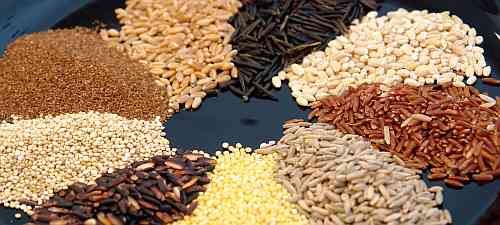When I was in medical school we studied and practiced nutritional medicine in our student clinic. Dietary and lifestyle changes were at the core of what we taught to our patients. I don’t ever remember recommending a grain-free diet, except in cases where we prescribed a ketogenic diet as a medical diet for managing epilepsy (reports of the effectiveness of ketogenic diets for epilepsy go as far back as the 1920s). Instead, we instructed patients on how to implement a whole foods diet, with plenty of colorful vegetables, beans and lentils, nuts and seeds, healthy fats and oils, lean protein (vegetarian and/or meats)…and WHOLE GRAINS! And you know what? Our patients felt better. They had more energy, they had reduced sugar cravings, they lost weight and they even had more regular bowel movements.
Fast forward fifteen years and everywhere you turn, the dietary advice from all the latest experts is mostly grain-free…forever! “Grains are toxic” we are told. But are there any life-long studies on people who eat grain-free diets to know what could happen to our overall health?
Furthermore, I am at the point now where I have observed enough patients on grain-free diets in my clinic that I am becoming convinced that they are not sustainable. The trend I see is that people tend to cycle on and off of these diets and end up weighing more than they did when they started, and they often find that they no longer lose any weight or feel a difference when they go back to a strict grain-free diet. Bottom line is that grain free diets might help you lose weight initially but there is no evidence that they are good for your health long-term; actually based on new evidence, quite the contrary (as I will explain further in this article.)
Sustainability problems
Take the example of a female patient of mine who I had treated for PCOS, obesity and fatty liver. She had been prescribed a low glycemic diet with minimal grains and starches. She still struggled with weight because she had a lot of difficulty with cravings and would end up overdoing it on carbs. When she finally got pregnant, she was transferred to diabetes management because of her insulin resistance and borderline elevated blood sugar levels. She was instructed to eat a diet balanced in carbs which even included snacks of cheese and whole grain crackers during the day. She told me that she no longer would binge on carbs when she got home from work and in the evening. I thought that was a bonus, but what impressed me even more was her blood test results. She had improved insulin and blood sugar…and she was no longer putting on weight, even in the midst of a pregnancy. For this patient, restricting grains as a long-term eating strategy was not working. Sound familiar?
Maintaining your weight, instead of losing it
Have you ever wished you were back to the same weight you were when you first started dieting? Primary care approaches to weight management have even changed in recent years. As you may know, obesity rates are still rising. Instead of attempting to have patients lose weight, recommendations are starting to change to maintaining current weight, thereby curtailing additional weight gain measured year to year at an annual physical. For this reason, dietary advice MUST be sustainable, and for most people, eating a grain-free diet is very difficult to maintain. And even if it is easy for you, should you stay on it long-term? Are there negative health consequences? As you know, I love to review the science behind all of this, so here comes the research part.
Eating whole grains reduces the risk of death from ALL causes
Two major meta-analysis prospective studies published in 2016 in very respectable medical journals, Circulation and the British Medical Journal, demonstrated very clearly that consumption of whole grains reduce the risk of coronary artery disease, cardiovascular disease, total cancer and the risk of dying from ALL causes. In one of the papers, the researchers pooled data from 14 eligible studies including almost 800,000 people with nearly 100,000 deaths, while the second paper examined the results from 45 cohort studies (meaning MASSIVE amounts of data analyzed). In both studies, the conclusion was a robust positive impact on health from eating whole grains.
These benefits were obtained by people who consumed at least 3 servings of whole grains daily. A serving of whole grain is defined as about 30 grams which is an average slice of whole grain bread. How many servings of whole grains are most of us actually consuming? The answer may surprise you. The average American eats less than 1 serving of whole grains per day.
The most widely studied diet for cardiovascular health, diabetes and reduction of all cause mortality is the Mediterranean diet. And what does it consist of? Healthy fats from olive oil, nuts and seeds, poultry, eggs, seafood, lots of colorful fruits and vegetable. legumes and WHOLE GRAINS. The Mediterranean diet has been shown to improve the pattern of DNA expression to influence genes associated with inflammation and fat metabolism.
What are you missing out on when you skip whole grains?
Whole grains contain a multitude of naturally occurring, health promoting compounds. Of course, most people recognize whole grains to be a rich source of dietary fiber. Fiber in whole grains has broad reaching positive effects including:
- mechanical removal of damaged cells from the digestive tract
- a fermentable source for bacterial action, resulting in higher levels of short chain fatty acids (SCFAs), which are needed for a healthy microbiota
- increases stool bulk, dilutes carcinogens and improves their transit time out of the body
- reduces cholesterol concentrations by inhibiting reabsorption of cholesterol
- binds estrogens and improves removal of estrogens through the stool
Whole grains also contain a good amount of magnesium which can improve insulin sensitivity and reduce blood pressure. Other minerals in whole grains include iron, zinc, selenium and copper. There are bioactive compounds like carotenoids, tocopherols and polyphenols in whole grains which can impact gene expression, thereby improving long-term health (more on that next).
Why are people who eat whole grains, less likely to die?
The health benefits of whole grains can be attributed to a number of factors. Certainly, the types of fiber in whole grains have the effects outlined above. A second finding is that people who eat whole grains have lower levels of inflammatory markers, like CRP, which is the opposite of what you are hearing out there about whole grains. In fact, the results from the Iowa Women’s Health Study showed that women who eat whole grains are less likely to die from inflammatory diseases beyond cardiovascular disease and cancer, such as infectious diseases, respiratory diseases and digestive system diseases.
Which unique bioactive compounds are found in whole grains?
Bioactive compounds are defined as extra nutritional elements that are present in foods that are not considered essential to human health, but have tremendous health benefits. What defines a whole grain is the presence of the germ, endosperm and bran portions, as opposed to refined grains which only contain the endosperm. The bioactive compounds are found primarily in the bran/germ portion which helps to explain why only whole grains can have such a tremendous impact on our health span.
The main bioactives in whole grains are phenolic compounds, phytosterols, tocols, dietary fibers (mainly beta-glucan), lignans, alkylresorcinols, phytic acid, γ-oryzanols, avenanthramides, cinamic acid, ferulic acid, inositols and betaine. Some of these are found in other plants, but many are uniquely found only in whole grains in high levels, and some only in certain grains. For example, avenanthramides are found specifically in oats and have anti-inflammatory, anti-atherogenic and anti-oxidant properties. Plant sterols are found in much higher levels in whole grains and can reduce cholesterol. Multiple studies have also shown plant sterols to help with colon cancer prevention. Gamma-oryzanol found in whole grain rice is a powerful anti-oxidant and is an effective treatment for hyperlipidemia, menopausal symptoms and can increase muscle mass.
Conclusion
Research is continuing to show us the power of food as medicine. Skipping a major source of phytochemicals by choosing to eat grain-free for the rest of your life may not be a wise decision. Of course, in this era of factory farming with the widespread use of pesticides and other chemicals used in food production, we must be aware that some of the ill effects of dietary factors on our health may be attributed to food that is essentially ‘unnatural’. Whenever possible, it is important to choose foods that are grown organically, the way nature intended.
Works Cited
1. Zong G, Gao A, Hu FB, Sun Q. Whole Grain Intake and Mortality From All Causes, Cardiovascular Disease, and Cancer: A Meta-Analysis of Prospective Cohort Studies. Circulation. 2016 Jun 14;133(24):2370-80. doi: 10.1161
2. Aune D, Keum N, Giovannucci E, Fadnes LT, Boffetta P, Greenwood DC, Tonstad S, Vatten LJ, Riboli E, Norat T. Whole grain consumption and risk of cardiovascular disease, cancer, and all cause and cause specific mortality: systematic review and dose-response meta-analysis of prospective studies. BMJ. 2016 Jun 14;353:i2716. doi: 10.1136
3. Gani A, Wani SM, Masoodi FA, Hameed G (2012) Whole-Grain Cereal Bioactive Compounds
and Their Health Benefits: A Review. J Food Process Technol 3:146. doi:10.4172/2157-7110.1000146


Comments 2
Thank you for this wonderful article on whole grains. It finally makes sense to me why I, as a person with chronic illness, do well on grains even though people say I shouldn’t do well. 🙂 When I tried to go off them, I experienced a slowing of digestion that made me feel sicker. I also struggle with healthy microbiota because of toxic injury, so it is good to know grains can help this as well. I recently switched to organic and now feel even better on whole grains. 🙂
Author
Hi Christa, I am glad to hear you are feeling better!
JS